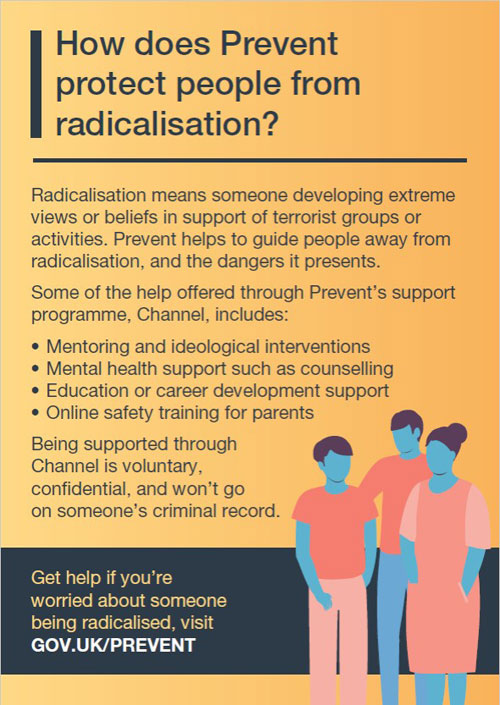Prevent and Channel: Preventing Radicalisation and Involvement in Extremism
Reporting Concerns about Terrorism
If it is an emergency, dial 999.
If you consider anything to be suspicious or connected with terrorism:
- Contact Greater Manchester Police on the non-emergency number 101 or
- Anti-Terrorist Hotline on
 0800 789 321 or
0800 789 321 or - Complete a confidential on-line form.
If you suspect it, report it.
The National Counter-Terrorism Strategy (CONTEST)
The Government’s counter-terrorism strategy (CONTEST), has four areas of work:
- Pursue: to stop terrorist attacks;
- Prevent: to stop people becoming terrorists or supporting terrorism;
- Protect: to strengthen our protection against a terrorist attack; and
- Prepare: to mitigate the impact of a terrorist attack.
More information about CONTEST
What is Prevent?

The threat we face from terrorism is real and the Prevent strategy recognises that we can’t arrest our way out of the problem. The Prevent strategy therefore aims to stop people becoming terrorists or supporting terrorism.
The focus of Prevent is on the significant threat posed by international terrorism and those in the UK who are inspired by it. But it is also concerned with reducing threats, risks and vulnerabilities posed by domestic extremists such as those from the far right and far left, extreme animal rights activists and those involved in Northern Irish related terrorism.
Prevent is supported by three objectives:
- Responding to the ideological challenge of terrorism and the threat we face from those who promote it (ideology);
- Preventing people from being drawn into terrorism and ensure that they are given appropriate advice and support (individuals); and
- Working with sectors and institutions where there are risks of radicalisation which we need to address (institutions).
Prevent Duty Guidance - https://www.gov.uk/government/publications/prevent-duty-guidance
Channel
The multi-agency approach to protect people at risk from radicalisation is called Channel. This uses existing collaboration between local authorities, statutory partners (such as the education and health sectors, social services, children and youth services and offender management services), the police and the local community to:
- Identify individuals at risk of radicalisation or involvement in terrorism;
- Assess the nature and extent of that risk; and
- Develop the most appropriate support plan for the individuals concerned.
Channel is about safeguarding children and adults from being drawn into involvement in terrorism. It is about early intervention to address vulnerabilities, and divert people from harm.
Channel Duty Guidance - https://assets.publishing.service.gov.uk/government/uploads/system/uploads/attachment_data/file/964567/6.6271_HO_HMG_Channel_Duty_Guidance_v14_Web.pdf
As per the Prevent Duty the Channel Panel in Tameside is a partnership meeting and meets monthly. Any panel member can escalate any concerns through their respective organisations dedicated safeguarding lead. Annual reports are made to each of the safeguarding boards and the Community Safety Partnership. The Community Safety Partnership makes an annual report to the Council’s cabinet.
Referrals
For more information about how the Council is contributing to Prevent, please email prevent@tameside.gov.uk.
If you want to make a referral, please find the Prevent Referral form here and email the completed form to prevent@tameside.gov.uk AND channel.project@gmp.police.uk
How to Report Concerns about Individuals at Risk
If you have any further concerns for vulnerable individuals, you can report it as follows:
- For a child or young person (during office hours) contact the Children’s Multi Agency Safeguarding HUB on
 0161 342 4101 or online at Worried about a child? (tameside.gov.uk)
0161 342 4101 or online at Worried about a child? (tameside.gov.uk) - For a vulnerable adult contact the Adult Safeguarding Team on
 0161 342 5217 or online at Adult Services (tameside.gov.uk)
0161 342 5217 or online at Adult Services (tameside.gov.uk) - Outside office hours call
 0161 342 2222.
0161 342 2222.
Training and Learning More about Prevent
Please visit the ACT Early website to learn more about the police’s important safeguarding role and the signs and vulnerabilities that may be presented when someone is being led down the path of extremism.
Please click on the following link to access the free Home Office e-learning training package on Prevent…
There are also a range of briefing products available to raise awareness about counter-terrorism and Prevent. These are accredited by the Home Office and Association of Chief Police Officers, and are delivered free of charge by the Greater Manchester Police Prevent Engagement team.
For more information, please contact:
PC David Bull
Email: david.bull1@gmp.police.uk
Tel: 0161 856 6345
Mobile: 07468718012

